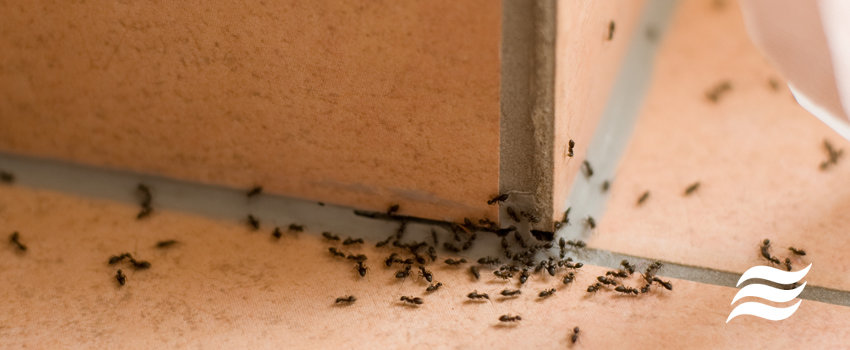
7 Ways to Keep Pests Out of Your Home and Your HVAC System
As soon as winter’s gone and spring starts to appear, the pests start crawling out from where they were sleeping. Next, we’ll be into summer, and those pesky intruders will be looking for food and shelter from the heat.
Your HVAC system keeps the temperature nice and comfortable, and there’s a lot of food in your pantry ready to be swiped; your home is the perfect hideout for bugs and vermin to thrive!
Unfortunately, even the smallest of insects can cause irreparable damage to your HVAC system and your house. In addition to the medical concerns that come with disease-carrying vermin residing in your home, you’ll also have to worry about them breaking down your HVAC system and ruining your spring and summer fun.
Don’t worry, though! You can prevent these unwelcome guests from entering your home by following just a few steps to pest-proof your home in Northern Virginia this spring.
What Kind Of Pests Damage Your HVAC System?
There are many different pests out there that can seriously damage your HVAC system and wreak havoc on your home.
Here are five types of pests that are commonly found in HVAC systems in Northern Virginia.
1. Mice
Mice are probably the most common type of pest found in HVAC systems in Northern Virginia. Mice will often nest inside air ducts, which is incredibly bad for your health as they can cause air pollution in your home from their droppings, rotten food, and harmful bacteria.
Rodents spread more than 200 human pathogens, so if you think you’ve got mice or other rodents, it’s a good idea to get rid of them as soon as you can.
Mice can also cause electrical fires with their nests and, on occasion, can cause a complete HVAC system failure. Mice and other rodents like rats are known for chewing on absolutely everything, so they could go to town on your insulation and wiring too.
2. Roaches
Insects love cool and dark places, making your HVAC system an ideal spot to nest and breed. They can fit their body through even the smallest of cracks, and once they get inside your unit, they’ll make themselves at home.
Roaches create quite a lot of noise when they move around, so you’ll be able to hear them if you’ve been infested. The main concern with having roaches in your HVAC unit is the bacteria they could be carrying. If you hear roaches about, it’s best to call a pest control company to get rid of them before they cause any damage.
3. Ants
Did you know that ants are drawn to electromagnetic fields often found in HVAC systems?
Once they get inside your unit, they’ll make a lovely cozy home for themselves and start building up a colony. An estimated 50% of US homeowners will deal with an ant problem every year, making them an annoying pest to deal with.
Despite being tiny, ants can cause severe damage to your condenser and often cause major breakdowns or failures. If you notice an anthill near your unit outside, it’s a good idea to get rid of it quickly.
4. Snakes
Snakes are attracted to your ductwork because of how warm it is during the winter and how cool it is during the spring or summer months. It’s also the perfect place to hide away from predators and other potential threats.
5. Raccoons
It’s not uncommon to find raccoons in your HVAC system, and they can do serious damage too. They can cause electrical problems, ventilation issues, and they can even block air circulation in your home.
How Do You Stop Pests From Getting Into Your HVAC System?
Now that we know what kind of pests can pop up in your HVAC system, it’s time to figure out how you can start getting rid of them.
Here are seven ways you can keep pests out of your home and your HVAC system.
1. Have A Professional Inspect Your HVAC System
Your HVAC system is incredibly susceptible to pest problems, and these pests can easily damage and potentially cause your HVAC system to stop working altogether.
To help reduce the chance of being invaded by pests, you should try and schedule an inspection with a local HVAC specialist to ensure that no sign of pests goes unnoticed.
This inspection will also help you ensure that your system is ready for the spring and summer heat to come. Nothing is worse than having an HVAC system break down when you need it most.
2. Clear Out Existing Pest Waste
If you’ve discovered that a part of your HVAC system was infested, then you’ll notice that they’ve left things like droppings, nests, and potentially food scraps behind. Some other good signs that you’ve had pests in your system are if you see scratches, chewed cords, damaged wood, or even some dead bugs.
You should thoroughly clean out this area because if you leave behind evidence that these pests were here, similar pests will think that they can make it their home too.
Removing pest waste will also help prevent the spread of disease and improve indoor air quality. After all, dust, dander, and bacteria from pests can greatly affect indoor air quality, which can cause allergy-like symptoms.
3. Seal Vents & Other Entry Points
Dealing with pests after they’ve entered your home is challenging, so before you get invaded, it’s a good idea to set up precautions to stop pests from entering your HVAC system and your home.
Take note of the potential entry points throughout your home. Vents, flues, windows, doors, and other small cracks and openings leave your home vulnerable to pests.
Sealing up these entry points with caulk, weather-stripping, and insulation keeps pests at bay and, as a bonus, improves your home’s energy efficiency.
4. Tighten Up Your Ductwork
One of the most common places for pests to hide once they have entered your home is your HVAC system ductwork.
By adequately sealing off entry points to your ducts, you’ll be able to minimize the pests’ ability to hide and navigate your house.
Make sure that:
- All panels are properly connected
- All screws are fastened tight
It may not keep pests out of your home completely, but it will help you manage how easily they get around while they’re inside.
5. Control Vegetation Around Your Exterior Unit
Most homes have an outdoor component powering the HVAC system called a condenser. This component alone costs around $2,000 and is responsible for cooling your home, so you don’t want any pests breaking it.
The last thing you want to find out at the beginning of the spring season is that your condenser isn’t working. So to keep pests away and keep your condenser working, make it as uninhabitable as possible.
This means keeping grass and other plants trimmed around the back of your outdoor unit so it doesn’t attract any mice, rats, snakes, and other pests.
Remember, if you see an anthill near your condenser, it’s a good idea to call a professional to remove it. They could quickly get into your condenser and play havoc.
6. Limit Moisture & Humidity
Did you know that bugs love damp, humid environments?
This means they’re going to adore your HVAC system and see it as prime real estate. The more bugs you get in your unit, the more they’ll damage things, and they might even cause your system to fail, depending on how many there are.
To keep your HVAC system as bug-free as possible, make sure your yard is drained correctly and use portable dehumidifiers to keep your home as moisture-free as possible. The less humid your property is, the less likely your HVAC system will become overrun with bugs.
7. Maintain A Tidy Home
Crumbs and other food waste can attract bugs like moisture, attracting bugs to your home and condenser. Pests are scavengers and live by putting together meals in any way they can. That means that when food is around, bugs will do anything they can to get it.
A proper cleaning regime prevents these pests from being interested in your home, and a clutter-free home, both inside and out, lets you monitor your HVAC system and note pest problems.
If you clean your home frequently, you’ll also notice any signs of pest waste, which will tell you they’re hiding out in your ducts. After that, it might be time to call pest control.
We hope we’ve helped you figure out how to solve (or preferably prevent) a pest problem, but if you have any questions about how to deal with pests in your HVAC, then our team would love to answer them.
Here at Nichols & Phipps, we want to ensure that you have a stress-free spring and summer without any HVAC mishaps. If you’d like to get your HVAC system inspected by one of our professionals, then call us today on (703) 670-8519.
Check out our other blogs for some great HVAC advice:
- Monthly Guide To HVAC Maintenance
- The 5 Biggest HVAC Myths
- How to Get Your AC Read For Summer After A Long Winter
- Pet Owners! Get More Life Out Of Your HVAC Unit With These 6 Tips
- Gas Leaks and How to Prevent Them
- How to Remove Humidity From Your Home
- Signs of a Damaged Furnace Heater
- 5 Biggest HVAC Myths
- 5 Tips For Spring Cleaning Your HVAC System
